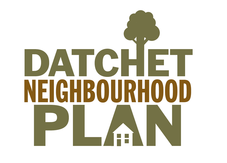PLANNING FOR CLIMATE CHANGE

Datchet’s Neighbourhood Plan team has started to investigate how new development could adapt to the challenges of climate change. As it was not possible to meet with residents during the summer to discuss this, we asked for comments via an online survey. A paper version was also available in The Link magazine or on request. We had 60 responses. Very many thanks to everyone who responded.
The results
We asked what you thought about various climate change issues
- 76% of you said you felt at risk from climate-change issues locally
- 72% said that flood waters have impacted or have the potential to impact on your property and way of life, particularly if they were to worsen in severity.
- 83% thought that floodwaters should be directed to green spaces during flood events to prevent flooding of homes and businesses
- 47.5% thought that heatwaves have impacted or have the potential to impact on their quality of life and health, particularly if they were to worsen in severity or frequency. 32.2% thought that maybe they had had an impact or potential to do so.
- 68.3% thought that Datchet should be addressing climate change issues better.
- 36.7% said they struggle or sometimes struggle to heat their homes in winter.
- 69.5% said they struggle or sometimes struggle to keep their homes comfortable during heatwaves.
- 95% agreed that future developments should be designed to have high energy efficiency and low energy running costs to 'design out' fuel poverty.

We asked how new development could do more to minimise climate change and its effects and which of the following statements you agreed with.
- 88.1% agreed that new buildings should have renewable energy built in, providing as much of the building’s energy needs as possible from renewable energy on-site.
- 89.8% thought that new buildings should be designed to be highly energy efficient/carbon neutral, in order minimise the need for heating and cooling (e.g. thicker walls, south-facing glazing with integral shading, designed for natural ventilation and to be resilient to extreme weather).
- 74.6% said new buildings should be designed to be highly sustainable in design and construction, using sustainable materials with low embodied energy (i.e. energy-efficient to produce).
- 79.7% thought that, through their design, layout and landscaping, new buildings should be designed to be resilient to overheating during heat waves.
- 67.8% said new buildings should have facilities for drying laundry outside.
- 47.5% agreed that new buildings should have secure, weatherproof bike storage, usable by all.
- 66.1% said new buildings should incorporate green roofs and walls to help reduce flooding (by slowing down rainwater run-off), to reduce heat extremes and provide wildlife habitat.
- 76.3% thought new development should utilise natural drainage systems such as soakaways, ponds and ditches to help reduce flooding (by slowing down rainwater run-off) and provide wildlife habitat.

We asked you to suggest three ways that changes in planning could help to reduce the effects of climate change in Datchet. (Answers have been grouped by topic)
TREES & GREEN SPACES
Plant more trees
Protect our trees and green spaces
Stop gardens being turned into driveways.
Ensure green spaces and trees are protected
Tree planting programs to cool street and common areas,
We are building too much on open spaces this needs to stop
Stop paving over gardens and protect green spaces
Encourage tree planting in all new development and extend protection on existing trees throughout the village not just in the conservation area
Redesignate green spaces,
Green spaces should not be built on-rather brown field sites should be reused and unused properties (offices) converted into housing.
plant more trees and shrubs
Better management of green spaces, road verges etc.
Tree planting.
Stop Any building on green belt areas.
No building on Green Belt
Maintain good balance of green space in new builds
Keep natural hedgerows on roadsides
Protect and increase permeable and 'green' surfaces;
Promote community gardens and agriculture;
Create a network of green corridors (tree-lined development, street trees and hedges).
I think when the gravel pits [Cemex at Riding Court] are exhausted we should make them a carbon-neutral nature reserve that also offers paths for walkers and cyclists
Protect existing green areas.
TRAFFIC
Reduce cars movements,
Datchet bypass to reduce climate emissions in centre of datchet due to idling/queuing vehicles
change the village access to reduce traffic and harmful pollution
Understand that due to the location of our village people need to drive cars, therefore promote and indeed subsidise schemes to either encourage car sharing or electric or hybrid cars.
Reduce car, lorry and coach through traffic in Datchet by use of extensive traffic calming and traffic restricting measures
Bypass roads deleting all the polluting through traffic
20mph all throughout the village
PUBLIC TRANSPORT
Free bus passes for all and more bus lines.
Buses having priority in junctions.
Proper bus stops, busses not blocking the traffic flow
Better public transport to get me out of my car. I used to catch a bus and train to work, now I have to drive ever since the Slough bus service was replaced. If we can provide cheap and most importantly regular public transport, people will use it. The Windsor bus service is a waste of time when we already have the train and park and ride.
Let's get Datchet station platforms extended. Every time the Waterloo train comes in, it blocks the High Street of the extra pollution caused by waiting cars every half hour of every day.
Another way to lower emissions is make other places more accessible. From East of village you'd have to walk all the way down to the centre and up Slough Road to get to Slough. Why can't we have some access near Riding Court that can take you towards Upton Court Park and then into Slough.
Request network rail to extend the platform to minimise traffic - long trains blocking the level pass.
Level rail crossings.
CYCLING
Increase cycle routes
Introduce more cycle paths
Build more cycle routes and cycle parking to reduce car usage
Reduce pollution by creating/improving cycling routes.
Cycle path to Windsor to reduce traffic
Support the Borough Cycle plan to improve safety for cyclists and improve existing links in the Cycle /footpath network.
Bicycle paths, separated from roads.
Paths and cycle routes to link with the whole village
Improve and expand cycling routes.
GREENER ENERGY
Guidance on the no-gas [policy] from 2025 in individual properties - what is the alternative?
Guidance on electric charging for vehicles in new properties - rapid charge or slow charge?
Provide charging points in the village for electric cars.
Ensure that new builds have enough room for cars and car charging points, we need to be realistic that people needs cars due to Datchet's location, so let's mark them as green as possible
Infrastructure to bring on if not needed straight away
Solar panels offered to homeowners on an interest-free long-term loan by the government
Solar panel & heat-pump integration into buildings
Make green energy more available/accessible to all
Work with RBWM for grants for home owners for renewable energy
New builds to have some kind of solar energy storage.
SUSTAINABILITY
Design code that all buildings have to be built to that ensures homes are designed fabric first approach to reducing carbon and are energy efficient and sustainable
Ensure any new build homes use the most up to date construction techniques and incorporate modern materials
Considering long term benefit rather than short term cost and profit.
Using solutions to climate change as an initial, central planning point, rather than as a last thought.
Ensuring to consult experts in climate change and using their suggestions to really make a difference, rather than putting in cheap solutions which does not fully benefit.
Have an advisor that visits your home to give advice on what could be done in heatwaves and extreme cold.
Make new builds high quality so they are low Cost to run and maintain.
Encourage people to make their homes more sustainable when they alter/extend them by giving them tax breaks.
Design new buildings to be carbon neutral, energy efficient and green.
Rain water storage.
Working on educating and managing fly tipping and plastic rubbish - creating more recycling bins
FLOODING
Ensure new houses are built raised so flood waters can flow through the foundations without damaging property and belongings.
Reduced new build developments to minimse impact on natural flood resilience,
A lot of properties have paved over green spaces with non-drainable slabs they should be encouraged to find a more eco-friendly alternative
Restrict/reduce garden paving for better drainage rather than parking cars
Stop building on the flood plains
No building on floodplain,
Older properties should be made flood resilient and encouraged to update their efficiency by perhaps making grants available
Reinforced flood protection, bunds.
Review on EA water flow management of flood relief schemes.
Better maintenance of drainage.
Planning any new or temporary housing with regards to water run off
Education for locals that are at risk of flooding
Better flood protection.
Something must be done to reduce flooding risk. The Jubilee river has helped Maidenhead why are Datchet residents not being helped!
Better river water management i.e. dredging & clearing silted up areas
Building houses near flood plains with a void to allow water to run away.
No building on flood plain
Improve flood alleviation schemes
Provide a central Datchet Storm Water soakaway system inc flood alleviation and prevent other outside communities’ water from entering Datchet.
Reverse planning rules to return to only 30sq m extension to properties. thereby using minimum insertion into soakaway availability.
Ensure the River Thames Scheme is delivered, this relates to flood protection at present and climate change in the future.
Don’t build on flood plain
MISCELLANEOUS
Look at how other areas/council have involved the community around climate change, eg Newham Citizen Assembly.
Strategy to involve young people in the co-design of approach.
Full transparency of all work.
House design is always at least 20 years behind the times. My 1980s house was designed for a twin tub washing machine!
Plant more trees
Protect our trees and green spaces
Stop gardens being turned into driveways.
Ensure green spaces and trees are protected
Tree planting programs to cool street and common areas,
We are building too much on open spaces this needs to stop
Stop paving over gardens and protect green spaces
Encourage tree planting in all new development and extend protection on existing trees throughout the village not just in the conservation area
Redesignate green spaces,
Green spaces should not be built on-rather brown field sites should be reused and unused properties (offices) converted into housing.
plant more trees and shrubs
Better management of green spaces, road verges etc.
Tree planting.
Stop Any building on green belt areas.
No building on Green Belt
Maintain good balance of green space in new builds
Keep natural hedgerows on roadsides
Protect and increase permeable and 'green' surfaces;
Promote community gardens and agriculture;
Create a network of green corridors (tree-lined development, street trees and hedges).
I think when the gravel pits [Cemex at Riding Court] are exhausted we should make them a carbon-neutral nature reserve that also offers paths for walkers and cyclists
Protect existing green areas.
TRAFFIC
Reduce cars movements,
Datchet bypass to reduce climate emissions in centre of datchet due to idling/queuing vehicles
change the village access to reduce traffic and harmful pollution
Understand that due to the location of our village people need to drive cars, therefore promote and indeed subsidise schemes to either encourage car sharing or electric or hybrid cars.
Reduce car, lorry and coach through traffic in Datchet by use of extensive traffic calming and traffic restricting measures
Bypass roads deleting all the polluting through traffic
20mph all throughout the village
PUBLIC TRANSPORT
Free bus passes for all and more bus lines.
Buses having priority in junctions.
Proper bus stops, busses not blocking the traffic flow
Better public transport to get me out of my car. I used to catch a bus and train to work, now I have to drive ever since the Slough bus service was replaced. If we can provide cheap and most importantly regular public transport, people will use it. The Windsor bus service is a waste of time when we already have the train and park and ride.
Let's get Datchet station platforms extended. Every time the Waterloo train comes in, it blocks the High Street of the extra pollution caused by waiting cars every half hour of every day.
Another way to lower emissions is make other places more accessible. From East of village you'd have to walk all the way down to the centre and up Slough Road to get to Slough. Why can't we have some access near Riding Court that can take you towards Upton Court Park and then into Slough.
Request network rail to extend the platform to minimise traffic - long trains blocking the level pass.
Level rail crossings.
CYCLING
Increase cycle routes
Introduce more cycle paths
Build more cycle routes and cycle parking to reduce car usage
Reduce pollution by creating/improving cycling routes.
Cycle path to Windsor to reduce traffic
Support the Borough Cycle plan to improve safety for cyclists and improve existing links in the Cycle /footpath network.
Bicycle paths, separated from roads.
Paths and cycle routes to link with the whole village
Improve and expand cycling routes.
GREENER ENERGY
Guidance on the no-gas [policy] from 2025 in individual properties - what is the alternative?
Guidance on electric charging for vehicles in new properties - rapid charge or slow charge?
Provide charging points in the village for electric cars.
Ensure that new builds have enough room for cars and car charging points, we need to be realistic that people needs cars due to Datchet's location, so let's mark them as green as possible
Infrastructure to bring on if not needed straight away
Solar panels offered to homeowners on an interest-free long-term loan by the government
Solar panel & heat-pump integration into buildings
Make green energy more available/accessible to all
Work with RBWM for grants for home owners for renewable energy
New builds to have some kind of solar energy storage.
SUSTAINABILITY
Design code that all buildings have to be built to that ensures homes are designed fabric first approach to reducing carbon and are energy efficient and sustainable
Ensure any new build homes use the most up to date construction techniques and incorporate modern materials
Considering long term benefit rather than short term cost and profit.
Using solutions to climate change as an initial, central planning point, rather than as a last thought.
Ensuring to consult experts in climate change and using their suggestions to really make a difference, rather than putting in cheap solutions which does not fully benefit.
Have an advisor that visits your home to give advice on what could be done in heatwaves and extreme cold.
Make new builds high quality so they are low Cost to run and maintain.
Encourage people to make their homes more sustainable when they alter/extend them by giving them tax breaks.
Design new buildings to be carbon neutral, energy efficient and green.
Rain water storage.
Working on educating and managing fly tipping and plastic rubbish - creating more recycling bins
FLOODING
Ensure new houses are built raised so flood waters can flow through the foundations without damaging property and belongings.
Reduced new build developments to minimse impact on natural flood resilience,
A lot of properties have paved over green spaces with non-drainable slabs they should be encouraged to find a more eco-friendly alternative
Restrict/reduce garden paving for better drainage rather than parking cars
Stop building on the flood plains
No building on floodplain,
Older properties should be made flood resilient and encouraged to update their efficiency by perhaps making grants available
Reinforced flood protection, bunds.
Review on EA water flow management of flood relief schemes.
Better maintenance of drainage.
Planning any new or temporary housing with regards to water run off
Education for locals that are at risk of flooding
Better flood protection.
Something must be done to reduce flooding risk. The Jubilee river has helped Maidenhead why are Datchet residents not being helped!
Better river water management i.e. dredging & clearing silted up areas
Building houses near flood plains with a void to allow water to run away.
No building on flood plain
Improve flood alleviation schemes
Provide a central Datchet Storm Water soakaway system inc flood alleviation and prevent other outside communities’ water from entering Datchet.
Reverse planning rules to return to only 30sq m extension to properties. thereby using minimum insertion into soakaway availability.
Ensure the River Thames Scheme is delivered, this relates to flood protection at present and climate change in the future.
Don’t build on flood plain
MISCELLANEOUS
Look at how other areas/council have involved the community around climate change, eg Newham Citizen Assembly.
Strategy to involve young people in the co-design of approach.
Full transparency of all work.
House design is always at least 20 years behind the times. My 1980s house was designed for a twin tub washing machine!
We invited you to add any further comments you thought were relevant
We are increasing the population of Datchet without the appropriate infrastructure
Better consultation
For too long governments, councils and planners have been using cheap, ineffective "solutions" to climate change to appear to the wider community that change is happening, but it is not. This needs to change. We need to be fully investing in the future, by using the research of experts to influence what is being done to combat the issue. Designing with climate change in mind and implementing it to the highest level. Climate change needs to be a priority over cheap, irresponsible materials, and short term profit.
Instead of trying to boil the ocean, have a number of small objectives every 6-8 weeks that we could all get behind that are measurable. Have a Datchet group dedicate to this, with small change suggestions that we could all adopt. e.g. recycle don't bin group, advise on re-usable vs disposable e.g. make up remover pads, nappies, sanitary products
For those of us affected by flooding in 2014 it has left a constant fear which affects mental health.
No more large complexes of houses
Legislate for minimum sustainable standards in building
Adopt Healthy Streets Approach (TfL) for Datchet
In my view, the biggest risk associated to climate change in Datchet is flooding from the Thames. We need to find ways to pressurise RBWM and Environmental Agency to provide protection from flood (such as extension Jubilee river).
Better consultation
For too long governments, councils and planners have been using cheap, ineffective "solutions" to climate change to appear to the wider community that change is happening, but it is not. This needs to change. We need to be fully investing in the future, by using the research of experts to influence what is being done to combat the issue. Designing with climate change in mind and implementing it to the highest level. Climate change needs to be a priority over cheap, irresponsible materials, and short term profit.
Instead of trying to boil the ocean, have a number of small objectives every 6-8 weeks that we could all get behind that are measurable. Have a Datchet group dedicate to this, with small change suggestions that we could all adopt. e.g. recycle don't bin group, advise on re-usable vs disposable e.g. make up remover pads, nappies, sanitary products
For those of us affected by flooding in 2014 it has left a constant fear which affects mental health.
No more large complexes of houses
Legislate for minimum sustainable standards in building
Adopt Healthy Streets Approach (TfL) for Datchet
In my view, the biggest risk associated to climate change in Datchet is flooding from the Thames. We need to find ways to pressurise RBWM and Environmental Agency to provide protection from flood (such as extension Jubilee river).
Very many thanks to everyone who responded.
